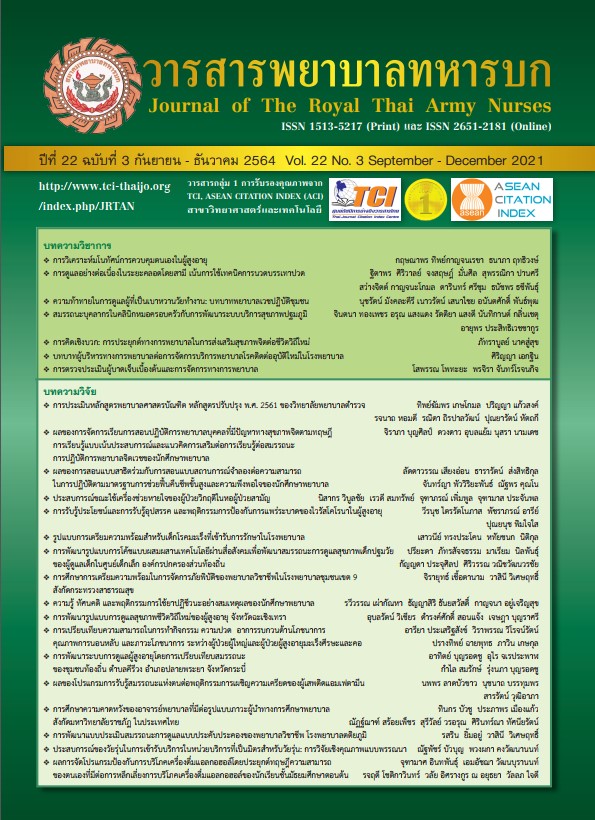Personnel Competency in Primary Care Cluster and Primary Health Care System Development
Keywords:
Competency, Primary Care Cluster, Primary Health Care SystemAbstract
The Primary Health Care System is a reform of the Health Service System to create health insurance for the people. It is the front-line health service of the public health service system by Primary Care Cluster (PCC) team that apply the principles of holistic care. Continuous care and comprehensive care as well as apply knowledge of medical sciences public health care and Psychology and Social Sciences for Health Promotion, treatment, prevention, and rehabilitation. This is a career that requires health consciousness in many dimensions. Personnel in PCC consequently play an important role in supporting the operation of the Primary Health Care System using the potential and uniqueness that are the strengths of each profession. Therefore, to promote and develop personal competency, interaction of relationship including professional ethics. It is essential for the development of Primary Health Care Systems to serve health services meet the needs of the people leading to efficient service Therefore, it is essential for the development of primary health care systems.
Downloads
References
Sumriddetchkajorn K., Shimazaki K., Ono T., Kusaba T., Sato K., Kobayashi N. Universal health coverage and primary care, Thailand. Bulletin of the World Health Organization. 2019;97(6):415.
Kitreerawutiwong K., Sriruecha C., Laohasiriwong W. Development of the competency scale for primary care managers in Thailand: Scale development. BMC family practice. 2015;16(1):1-9.
Silverman R., Sakuma Y., Post L., Beith A., Mirelman A. Health access for all: Thailand’s universal coverage scheme. In: Glassman A, Temin M, editors. Millions saved: new cases of proven success in global health. 3rd ed. Washington: Center for Global Development; 2016.89–96.
Tejativaddhana, P., Briggs, D., Singhadej, O. and Hinoguin, R. Developing primary health care in Thailand: Innovation in the use of socio-economic determinants, Sustainable Development Goals and the district health strategy, Public Administration and Policy. An Asia-Pacific Journal.2018; 21 (1):36-49.
Limwattananon S., Neelsen S., O’Donnell O., Prakongsai P., Tangcharoensathien V., van Doorslaer E., et al. Universal coverage with supply-side reform: the impact on medical expenditure risk and utilization in Thailand. J Public Econ. 2015;121(C):79–94.
Setthasiroj, B. Thailand 4.0 policy: which development model will achieve sustainable development?, presented at the 9th National Health Assembly, Grand Diamond Ballroom, Impact Muang Thong Thani, Bangkok. 2016.
Strasser, R., Kam, S.M. and Regalado., S. Rural health care access and policy in developing countries. The Annual Review of Public Health. 2016 37(3): 395-412.
Kitreerawutiwong N., Jordan S., Hughes D. Facility type and primary care performance in sub-district health promotion hospitals in Northern Thailand. PloS one. 2017;12(3): e0174055.
Primary Health System Act, B.E. 2562 (2019). Government Gazette Volume 136, Part 56 Kor. 2019.
Working group for driving and reforming the service system. Guidelines for Primary Operations care cluster for service units. Nonthaburi: Office of Policy and Strategy, Ministry of Foreign Affairs public health.2016.
Hongdilokkul N., Welfare analysis of the universal health care program in Thailand. Discussion paper 58. Bangkok: Puey Ungphakorn Institute for Economic Research; 2017.
Pongsupap, Y. Family medicine and community orientation as a new approach of quality primary care in Thailand, in Kidd, M. (Ed.), The Contribution of Family Medicine to Improving Health Systems: A Guidebook from the World Organization of Family Doctors, 2nd ed., Radcliffe Publishing, London. 2013; 231-240.
Tiantong S., Limwattanayingyong A., Wibulpolprasert S., Vedrasco L, Kertesz D. Towards optimal collaboration: reforming the WHO country cooperation strategy in Thailand. Bulletin of the World Health Organization. 2019;97(9): 642-644.
Muijsenbergh V.D., Van Weel M. The essential role of primary care professionals in achieving health for all. The Annals of Family Medicine. 2019; 17 (4): 293-295
Komjakraphan P., Balthip K., Jittanoon P. Quality of work life among nurse practitioners working at primary care setting in Thailand. Songklanagarind Journal of Nursing. 2017; 23(37):98-105.
Ishimaru T., Punpeng T., Maiyapakdee C., Ketsakorn A., Fujino Y., Hara K. Survey of the necessary competencies and proficiency of safety officers in Thailand. Industrial health. 2020; 2019-0205.
Rungamornrat S., Musikthong J. Competency in health promotion of nursing professionals in central area of Thailand. Nursing Science Journal of Thailand. 2016;34(1):88-100.
Thasaneesuwan S., Chuaytaen T., Tinkaew P., Nilmanat K., Sae-chit K. Effects of a Palliative Care Education Program on Palliative Care Competencies of Registered Nurses in a Community Hospital in Southern Thailand. Songklanagarind Journal of Nursing. 2020; 40(2):122-32.
Downloads
Published
How to Cite
Issue
Section
License
บทความหรือข้อคิดเห็นใดใดที่ปรากฏในวารสารพยาบาลทหารบกเป็นวรรณกรรมของผู้เขียน ซึ่งบรรณาธิการหรือสมาคมพยาบาลทหารบก ไม่จำเป็นต้องเห็นด้วย
บทความที่ได้รับการตีพิมพ์เป็นลิขสิทธิ์ของวารสารพยาบาลทหารบก
The ideas and opinions expressed in the Journal of The Royal Thai Army Nurses are those of the authors and not necessarily those
of the editor or Royal Thai Army Nurses Association.






